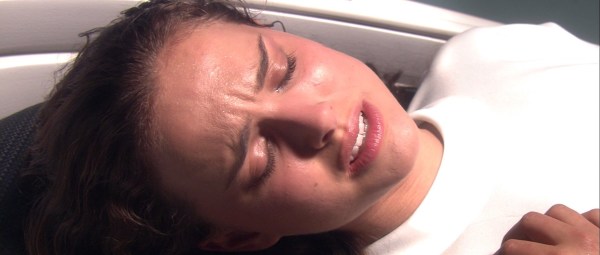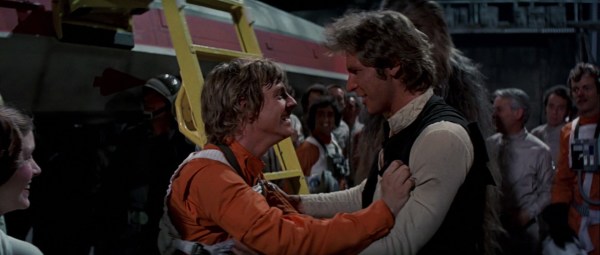Star Words: Episode III, Part 42
Feb. 7th, 2019 11:50 amAnd so Padmé slips into death, minutes after birthing and naming her twins, seconds after Vader -- born from the ashes of Anakin's fall -- takes his first ominous breath. With her last breath, however, she speaks the words that represent the truth at the very heart of the saga: hope.
"There's good in him. I know. There's still..."

(A quick side note -- both Padmé and Shmi's final words are cut short before they finish their sentences. It could be a mere touch of realism, as death rarely comes at a convenient instant, but I also feel that it symbolizes the cruelty of the encroaching Empire, which aims to silence every kind and gentle voice in the galaxy. Because I overthink everything.)
When I saw Episode III for the first time, even as I was crying bitterly at the overwhelming tragedy of this sequence, this line made my heart sing. It was becomingly increasingly clear to me how much Luke had inherited from his mother, and these final words were the perfect capstone. It is a birthright of unshakeable love and optimism. Not blindness or naiveté; not a foolish delusion that everything is hunky-dory in spite of obvious evidence to the contrary. Nor is it masochism or a tendency to martyr oneself or let others harm you. It is wiser than that. It is nothing less than hope in the face of darkness and despair; it is love without any conditions, a faith in people's best selves.
It always surprises me to find Star Wars fans who see Anakin's return to the good side as a kind of incidental moment in Return of the Jedi, who focus on the defeat of the Empire and destruction of the second Death Star (those are moments of grand excitement, don't get me wrong!) while merely shrugging about the Luke/Vader confrontation. Worse, they fixate angrily on the rigid mathematics of cosmic justice and argue that one semi-good deed shouldn't be enough to earn Anakin a place in the Jedi afterlife. They think Luke is still kind of whiny and naïve and so on and so on. It's so odd that we could watch the same films and yet see completely different stories!
To me, Anakin's return is everything. The very title of the film implies it. Luke hasn't been a Jedi yet, so it's about more than him as a single Jedi. It's about the rebirth of the Jedi Order as a whole, and the return of a Jedi who has forsaken his ideals for far too long. Hence the beauty of titles with ambiguous meaning, which happened decades before people were speculating about the possible plural connotations of "Jedi" in the 2017 film. Ahem.
Anyway, as far as I'm concerned, everything in the saga leads up to that moment when Luke throws away his saber and refuses to give in to aggression, when he sets the example of goodness and implores his father to follow him, and when Anakin steps forward and finally does the right thing. When Anakin reclaims his birthright of the Chosen One, symbolizing the rebirth of the Jedi and the Republic and all the light in the galaxy. Not because that one act can erase everything that came before it, but as a single step into the light -- a refutation of the notion that a turn to the Dark Side is forever irrevocable, proving that no one is ever so corrupted that they are not still capable of doing something good. That has been the theme of Star Wars since 1977. Consider how Luke's arc in the third act of Episode IV is, on a smaller scale, the same arc that he undergoes in Episode VI. He sees that someone close to him has turned from the hero's path, is disheartened, but maintains hope that they can still make the right choice, even when it seems the least likely thing. Then he is vindicated when they step in at the last minute to help Luke save the day.
In the first film it's Han. Luke's belief is still immature, his responses more impulsive. But that belief is justified. By the last film, he carries a calm but impassioned assurance that his father will ultimately make the same sort of choice as Han, no matter how far down the path of darkness he has strayed.

A moment of giddy vindication

Another moment, far more somber, but deeply exaltant
So, to sum up a very long digression, Padmé's words are not a minor moment of foreshadowing. They are everything the saga stands for, a celebration of that unquenched spirit of hope that she passes on to her children even on the verge of death. We do not hear her name spoken in the original trilogy, but her legacy is carried within anyone who fights oppression, anyone who strives to restore freedom to the galaxy, within her daughter's fierce determination and her son's pure love.
Next time, the inimitable James Earl Jones gives us Vader's first words after his transformation....
"There's good in him. I know. There's still..."

(A quick side note -- both Padmé and Shmi's final words are cut short before they finish their sentences. It could be a mere touch of realism, as death rarely comes at a convenient instant, but I also feel that it symbolizes the cruelty of the encroaching Empire, which aims to silence every kind and gentle voice in the galaxy. Because I overthink everything.)
When I saw Episode III for the first time, even as I was crying bitterly at the overwhelming tragedy of this sequence, this line made my heart sing. It was becomingly increasingly clear to me how much Luke had inherited from his mother, and these final words were the perfect capstone. It is a birthright of unshakeable love and optimism. Not blindness or naiveté; not a foolish delusion that everything is hunky-dory in spite of obvious evidence to the contrary. Nor is it masochism or a tendency to martyr oneself or let others harm you. It is wiser than that. It is nothing less than hope in the face of darkness and despair; it is love without any conditions, a faith in people's best selves.
It always surprises me to find Star Wars fans who see Anakin's return to the good side as a kind of incidental moment in Return of the Jedi, who focus on the defeat of the Empire and destruction of the second Death Star (those are moments of grand excitement, don't get me wrong!) while merely shrugging about the Luke/Vader confrontation. Worse, they fixate angrily on the rigid mathematics of cosmic justice and argue that one semi-good deed shouldn't be enough to earn Anakin a place in the Jedi afterlife. They think Luke is still kind of whiny and naïve and so on and so on. It's so odd that we could watch the same films and yet see completely different stories!
To me, Anakin's return is everything. The very title of the film implies it. Luke hasn't been a Jedi yet, so it's about more than him as a single Jedi. It's about the rebirth of the Jedi Order as a whole, and the return of a Jedi who has forsaken his ideals for far too long. Hence the beauty of titles with ambiguous meaning, which happened decades before people were speculating about the possible plural connotations of "Jedi" in the 2017 film. Ahem.
Anyway, as far as I'm concerned, everything in the saga leads up to that moment when Luke throws away his saber and refuses to give in to aggression, when he sets the example of goodness and implores his father to follow him, and when Anakin steps forward and finally does the right thing. When Anakin reclaims his birthright of the Chosen One, symbolizing the rebirth of the Jedi and the Republic and all the light in the galaxy. Not because that one act can erase everything that came before it, but as a single step into the light -- a refutation of the notion that a turn to the Dark Side is forever irrevocable, proving that no one is ever so corrupted that they are not still capable of doing something good. That has been the theme of Star Wars since 1977. Consider how Luke's arc in the third act of Episode IV is, on a smaller scale, the same arc that he undergoes in Episode VI. He sees that someone close to him has turned from the hero's path, is disheartened, but maintains hope that they can still make the right choice, even when it seems the least likely thing. Then he is vindicated when they step in at the last minute to help Luke save the day.
In the first film it's Han. Luke's belief is still immature, his responses more impulsive. But that belief is justified. By the last film, he carries a calm but impassioned assurance that his father will ultimately make the same sort of choice as Han, no matter how far down the path of darkness he has strayed.

A moment of giddy vindication

Another moment, far more somber, but deeply exaltant
So, to sum up a very long digression, Padmé's words are not a minor moment of foreshadowing. They are everything the saga stands for, a celebration of that unquenched spirit of hope that she passes on to her children even on the verge of death. We do not hear her name spoken in the original trilogy, but her legacy is carried within anyone who fights oppression, anyone who strives to restore freedom to the galaxy, within her daughter's fierce determination and her son's pure love.
Next time, the inimitable James Earl Jones gives us Vader's first words after his transformation....